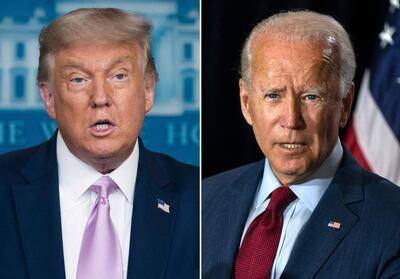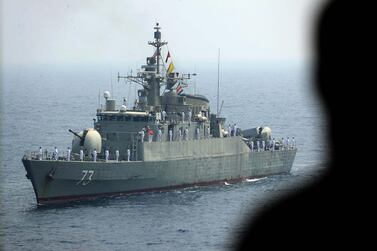Iran’s leaders believe that cornering US President Donald Trump with a series of provocations will weaken his re-election chances, assuming he would have to back down to avoid taking major risks before Election Day on November 3. But they are greatly mistaken. Iran would be misreading both the American and European positions if its Islamic Revolutionary Guard Corps were to engage in a confrontation with, say, Israel or the Gulf countries.
The European Council leaders will meet in Brussels on Thursday and Friday to discuss, among other things, the continent's fraying relations with neighbours Russia and Turkey. They may also have a debate on the 2015 nuclear deal, which the western powers signed with Iran in 2015 but looks in jeopardy for a combination of reasons. The Europeans are aware of likely Iranian retaliation should they rethink their commitment to the agreement. But they also realise that sanctions deployed by the US have proved punishing for the regime in Tehran, and may impose some of their own.
The Trump administration, meanwhile, intends to step up sanctions on Iran as well as on countries aiming to sell weapons to it after October 18, when China and Russia are expected to block American efforts to extend the arms embargo against Tehran at the UN Security Council. America's hardline stance, in other words, could have short- and long-term implications for the world – especially the Middle East.
Some European powers are expected to throw their weight behind a new resolution reaffirming the nuclear deal, as a means to absorb Iran’s anger at US sanctions that might come into effect in October. US Secretary of State Mike Pompeo has hinted at the possibility of returning to the Security Council to make another case for the arms embargo before it expires – even though vetoes from China and Russia might be inevitable at this stage. In which case, Washington might sell to its public a narrative that, by letting the embargo expire, Beijing and Moscow are effectively aiding Iranian transgressions in the Middle East, as well as its nuclear and ballistic programmes. This could be the way it makes the argument for imposing fresh sanctions against Iran and the two powers.
My conversations with experts in the US lead me to believe that some of these sanctions would all but cut off Iran from the rest of the world. And yet, the US realises that the time has not yet come to punish Iran and China for their new security pact. It has prioritised imposing sanctions in the foreseeable future, but its endgame would be to force China to disengage with Iran.
Tehran is in a conundrum less than two months before the US election. One segment of its leadership has argued for patience and prudence until it is over, while the other has sought confrontation and provocation. Whatever be its strategy to undermine Mr Trump’s re-election bid, it must know that US policy towards the regime is unlikely to change even if the current incumbent loses.
Some in Iran assume that Mr Biden will revive the nuclear deal and spare the country of sanctions. But this reflects a misunderstanding of American policy, some which has been baked into US law, leaving Mr Biden with little chance to overrule them – even if he wanted to do so. On the contrary, it might be naive to expect Mr Biden to reach out to the regime.

America’s electoral landscape indicates that Iran will be the Trump administration’s top target in the run-up to the election. The administration may even benefit from its likely failure to convince China, Russia and the Europeans to allow the extension of the arms embargo. Mr Trump will use it as ammunition to make the case for his hardline stance.
Mr Trump’s campaign team will encourage him to paint Iran and China as America’s biggest enemies. The Gulf-Israeli peace deals, brokered by his administration and signed in Washington, are also likely to favour the President in the upcoming debates with Mr Biden.
Apart from giving Mr Trump a win, the Abraham Accord has also come as a shock to Iran. The regime did not expect it would happen, and now it finds – no doubt to its chagrin – a largely positive reaction across the Arab and Islamic worlds. The regime has lost a strategic asset: Islamic anger. It will continue to bank on the support of proxies, Hezbollah in Lebanon and Hamas in Gaza, which probably explains the recent visit to Beirut by Hamas leader Ismail Haniyeh at Hezbollah’s invitation. But Iran must know that popular support for its continued exploitation of the Palestinian cause is waning.
Iran's other problem is that, even though the European Union might be careful how it plays its cards, there remains the likelihood of sanctions in the future for its destabilising operations in the Middle East, including inside Lebanon.
At the first e-policy circle of the Beirut Institute Summit in Abu Dhabi, Michelle Bachelet, the UN High Commissioner for Human Rights, reminded the international community to place human rights at the centre of its efforts to pressure the Lebanese political class to legislate and enact sweeping reforms, following the fatal Beirut Port blast a little more than a month ago.
For his part, Peter Maurer, president of the International Committee of the Red Cross, blamed “governance weakness and failures as an origin of humanitarian needs” for the situation in Lebanon. But he also expressed frustration at the international community’s lack of action regarding what he called the “strategic neglect of Lebanon and the Lebanese people”.
Given Iran's influence in Lebanon, the Europeans will be closely watching its actions there, particularly on the back of French efforts to press for political and economic reforms – something Tehran does not desire. Don't entirely rule out Lebanon becoming a point of discussion at the Brussels summit.
Raghida Dergham is the founder and executive chairwoman of the Beirut Institute






